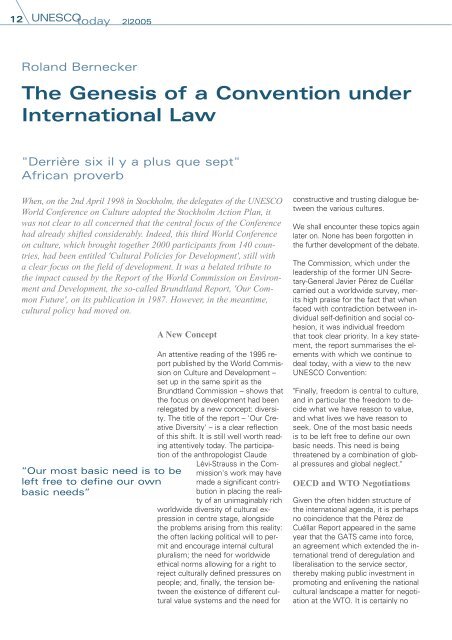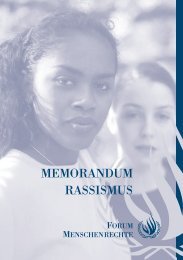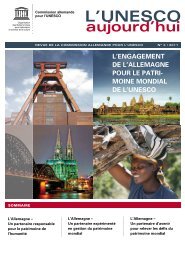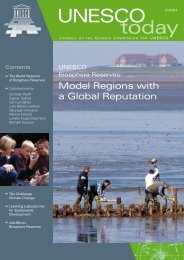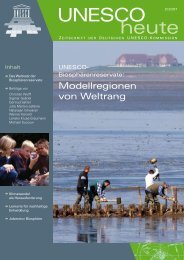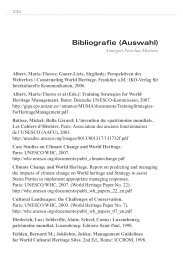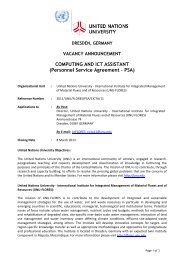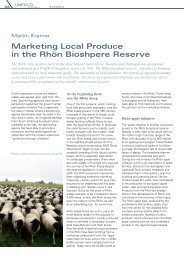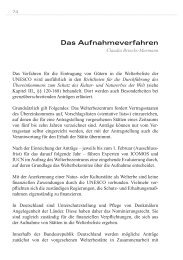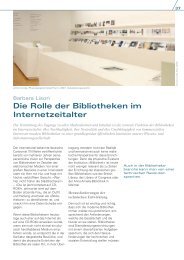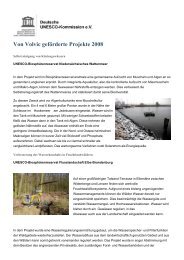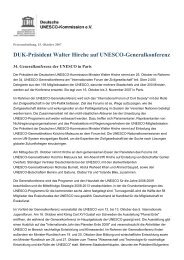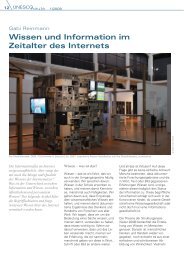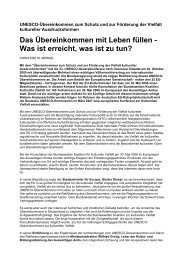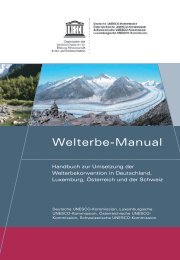Download - UNESCO Deutschland
Download - UNESCO Deutschland
Download - UNESCO Deutschland
You also want an ePaper? Increase the reach of your titles
YUMPU automatically turns print PDFs into web optimized ePapers that Google loves.
12<br />
<strong>UNESCO</strong> today<br />
2|2005<br />
Roland Bernecker<br />
The Genesis of a Convention under<br />
International Law<br />
"Derrière six il y a plus que sept"<br />
African proverb<br />
When, on the 2nd April 1998 in Stockholm, the delegates of the <strong>UNESCO</strong><br />
World Conference on Culture adopted the Stockholm Action Plan, it<br />
was not clear to all concerned that the central focus of the Conference<br />
had already shifted considerably. Indeed, this third World Conference<br />
on culture, which brought together 2000 participants from 140 countries,<br />
had been entitled 'Cultural Policies for Development', still with<br />
a clear focus on the field of development. It was a belated tribute to<br />
the impact caused by the Report of the World Commission on Environment<br />
and Development, the so-called Brundtland Report, 'Our Common<br />
Future', on its publication in 1987. However, in the meantime,<br />
cultural policy had moved on.<br />
“Our most basic need is to be<br />
left free to define our own<br />
basic needs”<br />
A New Concept<br />
An attentive reading of the 1995 report<br />
published by the World Commission<br />
on Culture and Development –<br />
set up in the same spirit as the<br />
Brundtland Commission – shows that<br />
the focus on development had been<br />
relegated by a new concept: diversity.<br />
The title of the report – 'Our Creative<br />
Diversity' – is a clear reflection<br />
of this shift. It is still well worth reading<br />
attentively today. The participation<br />
of the anthropologist Claude<br />
Lévi-Strauss in the Commission's<br />
work may have<br />
made a significant contribution<br />
in placing the reality<br />
of an unimaginably rich<br />
worldwide diversity of cultural expression<br />
in centre stage, alongside<br />
the problems arising from this reality:<br />
the often lacking political will to permit<br />
and encourage internal cultural<br />
pluralism; the need for worldwide<br />
ethical norms allowing for a right to<br />
reject culturally defined pressures on<br />
people; and, finally, the tension between<br />
the existence of different cultural<br />
value systems and the need for<br />
constructive and trusting dialogue between<br />
the various cultures.<br />
We shall encounter these topics again<br />
later on. None has been forgotten in<br />
the further development of the debate.<br />
The Commission, which under the<br />
leadership of the former UN Secretary-General<br />
Javier Pérez de Cuéllar<br />
carried out a worldwide survey, merits<br />
high praise for the fact that when<br />
faced with contradiction between individual<br />
self-definition and social cohesion,<br />
it was individual freedom<br />
that took clear priority. In a key statement,<br />
the report summarises the elements<br />
with which we continue to<br />
deal today, with a view to the new<br />
<strong>UNESCO</strong> Convention:<br />
"Finally, freedom is central to culture,<br />
and in particular the freedom to decide<br />
what we have reason to value,<br />
and what lives we have reason to<br />
seek. One of the most basic needs<br />
is to be left free to define our own<br />
basic needs. This need is being<br />
threatened by a combination of global<br />
pressures and global neglect."<br />
OECD and WTO Negotiations<br />
Given the often hidden structure of<br />
the international agenda, it is perhaps<br />
no coincidence that the Pérez de<br />
Cuéllar Report appeared in the same<br />
year that the GATS came into force,<br />
an agreement which extended the international<br />
trend of deregulation and<br />
liberalisation to the service sector,<br />
thereby making public investment in<br />
promoting and enlivening the national<br />
cultural landscape a matter for negotiation<br />
at the WTO. It is certainly no


